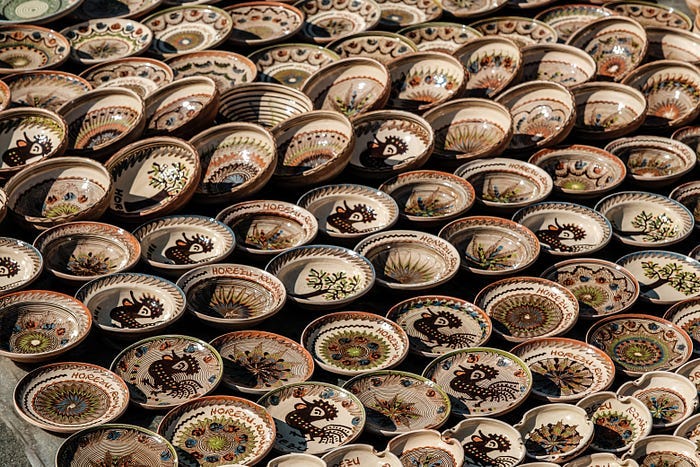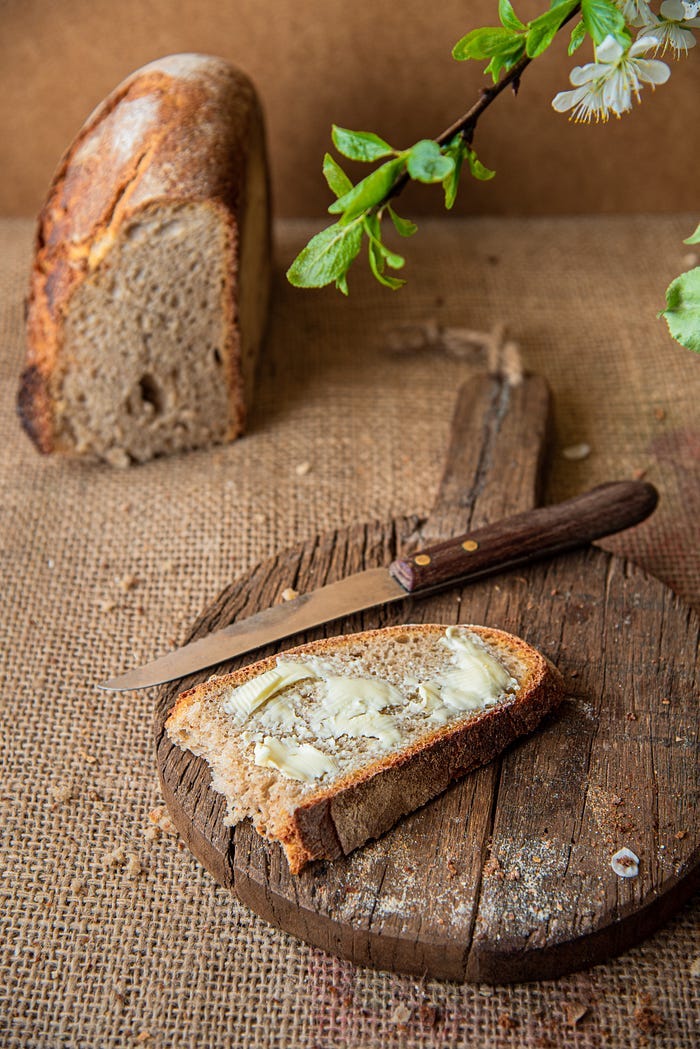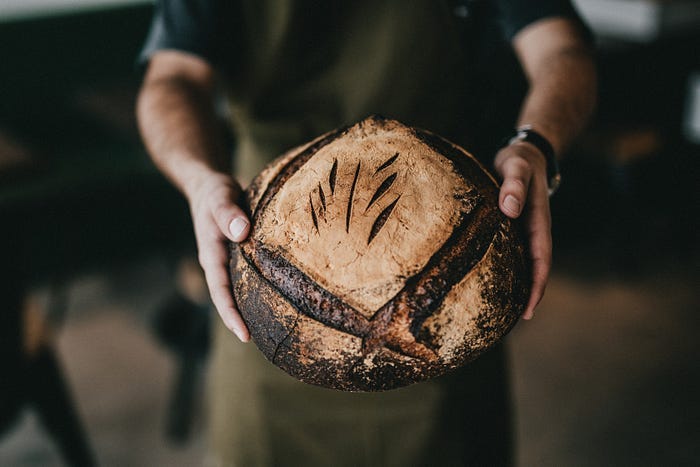The Price of Bread Is Directly Linked to Political Unrest
'Panem et circenses' still applies, even to this day
None of us function well on an empty stomach. We’ve all felt it — hunger pains lead to a bad mood.
Not knowing where your next meal is coming from can be extremely rough on your mental health. It brings anxiety, restlessness, even a sense of desperation.
I’ve known that fear personally. I’ve felt the tears in my eyes when I realized I didn’t have enough cash for my meal, and the gratitude and relief when the vendor took pity on me and told me I could eat now and pay her later.
When food costs rise, social unrest is never far behind it. You can almost track which countries are going to suffer from protests and riots just by looking at the charts of grain prices around the world.
See, bread is a staple, basic food that crosses most cultures — it’s existed for at least ten thousand years, if not longer! There’s an expectation that even if the price of other foods increases, as long as bread remains cheap, people will not go hungry.
So, when there’s a shortage of grain or flour, expect to see people in the streets.
Humans have a basic hierarchy of needs that needs to be met. Food and water are two of the most important items on the list, and when they become scarce, it’s no surprise that people get scared.
Today, with everything from war, price inflation, and climate change playing a role, people are getting very scared. Supply lines are being disrupted, costs are rising, and climate change is wrecking crops left right, and center.
The cost of putting food on the table is getting steadily higher.
It was this fear of increasing food prices that played a massive role in the last election of the United States. Unfortunately, the outcome is only making things worse for everybody.

When the Roman poet Juvenal spoke of how best to distract a population in times of strife, he used the phrase “panem et circenses.” Bread and circuses.
The phrase is meant to refer to how citizens can be lulled into forgoing their civic duties by providing them with entertainment and a full belly. So long as they can ignore the bad things in life, and they aren’t going hungry, they’ll continue on as if everything is fine.
Even if their neighbours are going missing, armed men are stalking through the streets and political violence is growing more and more unstable, as long as they’ve got a full fridge and a new show on Netflix most people will get by alright.
It’s only when stomachs are full of nothing but a hollow gnawing cramp, and the price of entertainment has gone up so far as to be out of reach that you begin to have a problem.
That’s when people remember that they have the power to demand change, right around the same time as they develop a motivation to use it.
Stability breeds contentment. Instability creates a drive for action.
And this has held true throughout history, going back centuries. A hike in the price of bread is inextricably linked to periods of social unrest.
That’s the handy thing about being human. Our power to delude ourselves into ignoring looming threats on the horizon is immense, but so is the strength of our rage once we break out of that stupor.

In the United States alone, I can think of many instances of rioting and even brutal violence over food costs.
In 1713, there was a tumultuous gathering in the Boston Commons over a grain shortage. Over 200 people turned up to rage about being unable to put bread on the table for their families.
In 1863, during the American Civil War, there were a series of riots in the Confederate towns over bread. Wartime inflation was elevating the costs of basic necessities, and the poorer working-class folks had reached their limit — to say nothing of the people they were keeping enslaved.
A shortage of bread and foodstuffs contributed to the unrest, largely due to the successful Union blockading of supply lines and ports. In fact, starving the Confederates was among the most effective strategies the Union army used to win the war.
‘Bread or blood’ was the common chant in these riots, and they only ended with a combination of well-placed cannons and a more careful distribution of food to the poor — the white poor, that is.
There’s still a hefty imbalance in food distribution between majority white communities and communities that consist mostly of marginalized people. The existence of ‘Food Deserts’ is a classic example.
Food has always been central to social stability. It’s the backbone of civilization — our large-scale communities could not exist without mass production of food. Once hunter-gatherer societies figured out how to plant crops, they began to form settled communities. Without agriculture, it was simply impossible.
From the French Revolution to the Arab Spring, food has consistently been one of the driving forces behind political upheaval.
Dictatorships have been toppled by the humble loaf of bread.

There’s an old saying that we sometimes curse one another with: “May you live in interesting times.” I think it’s safe to say we’ve been experiencing the meaning of that curse for a while now.
In my lifetime alone we’ve seen everything from horrific terrorist attacks, multiple wars, economic recession, a global pandemic, and rapidly escalating climate catastrophe. We’ve seen genocide, famine, and the rise of authoritarianism in a nation which used to parade itself about as a bastion of freedom.
It might not have lived up to its own standards, but it at least pretended to believe in democracy.
There’s more, but I don’t have enough coffee to deal with the full list. I doubt anybody does. Suffice to say, we’ve had a few rough patches recently.
Unfortunately, we’re likely in for a few more. According to the United Nations, food insecurity is on the rise around the world. This is not a good sign for many reasons.
At a time when we need to be able to come together and create solutions for the problems we’re facing as a planet, we’re staring down the barrel of even more division and outbursts of violence due to famine.
Some of the famine is even being caused by conflict — especially with Russia’s wartime tactics throwing a wrench into the global grain supply.

This is one of those global problems that requires a global solution. But there are things that those of us on the ground can do to help, at least on the local level. There are ways we can take the pressure off of supply lines when food shortages occur.
For starters, if you have the means to plant a few food crops, it might be a good time to learn how to garden. Even a few potted tomato plants in your apartment, or some cooking herbs. Snow peas have lovely flowers, and they’re wicked easy to grow.
Now that we’re moving into fall, it’s the perfect time to start learning and make plans to prepare a garden bed for next spring.
We revived the old Victory Garden tradition during the pandemic, there’s no reason we can’t keep it going. Especially if we add in learning how to preserve what we harvest.
You can also try stocking up on non-perishable staples when you can. Don’t empty the shelves at your grocery store, it blocks others from getting what they need. But grabbing an extra bag of rice, dried pasta, or a few extra cans of soup on your normal shopping trips won’t hurt.
You can also contribute to your local food banks and soup kitchens. Money is the best thing you can donate, as it allows them to obtain fresh produce and make more nutritious meals for the people who need the help.
The Trump administration has run a scythe through a lot of funding for programs like ‘Meals on Wheels’ so it’s especially important right now to help those in need.
And of course, we should all make an effort to reduce the amount of food we waste.

Rising food prices are a problem for all of us. Whether that be because it leaves our plates empty, or because it sparks violence in the streets, it still touches each and every one of our lives.
But even more than that, it’s a problem because of what food means to us.
Communities are built by food. We don’t just depend on it for survival, we attach so much symbolism to it as well. Our fondest memories are built around the foods we grew up eating, and we pass family recipes down like heirlooms from generation to generation.
Culture, identity, and the building blocks of who we are — food is the foundation of everything. It’s sacred to us, on top of being an essential ingredient for our existence. It’s hard to overstate how important it is to our sense of self.
So when the price of bread rises, the world trembles. And rightly so.
Solidarity wins.



You're right. Food shortages due to climate issues have taken down empires in the past. It looks like that's going to happen to the U.S. now. More and more farmers are losing their shirts over Trump's foreign policies and it's only a matter of time before there is a severe food shortage in the U.S.
The U.S. can't afford to grow it's own food anymore (I point to the farmers here), and with the people already on edge, all it will take is some food riots to set things off.
Way back during the 70's the USSR did not produce enough of its own wheat for itself (amazing considering that would have included the Ukraine at the time). USSR needed to import wheat but no one wanted roubles at the time. Instead, Canada traded wheat for tractors. A few years ago while on a local farm, I saw one of these red 4-wheel drive tractors still running.